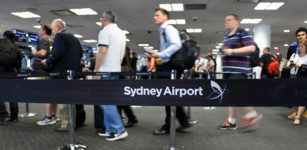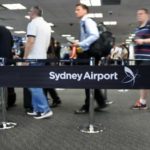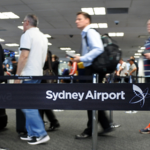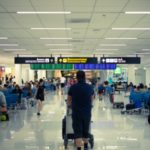AFP to Demand Anyone’s ID and Move Them On at Airports

As an example of when Australian Federal Police (AFP) officers would use proposed new powers that would allow them to demand any individual’s ID for any reason at major Australian airports, Home Affairs first secretary Hamish Hansford said they would be used when someone was waving an Islamic State flag.
Following Mr Hansford’s justification for these broadened powers, Home Affairs assistant secretary Ciara Spencer cut in during a 17 October public hearing regarding the new laws to clarify that they’d be used in the case of behaviour that could cause “mass panic”.
However, the enhanced search powers set out in the Crimes Legislation Amendment (Police Powers at Airports) Bill 2018 are so broad that AFP officers could apply them in just about any situation – certainly not just when “mass panic” is being provoked, or someone is unfurling a flag at an airport.
The proposed laws that are currently under the review of the Parliamentary Joint Committee on Intelligence and Security (PJCIS) allow officers to direct an individual to produce their identification, leave an airport or not take a flight for up to 24 hours and to stop anything to facilitate those orders.
Where these laws differ from current ones is that, at present, an officer can request an individual to produce identification if they reasonably suspect a person has committed a crime or intends to do so, whereas the proposals says officers can demand ID and move people on to ensure the “good order” of an airport – whatever that means.
Removing reasonable suspicion
“The airport ID law cuts the rights of ordinary Australians to be considered innocent unless they’ve actively done something wrong,” said Bill Rowlings, CEO of Civil Liberties Australia. “Our police are meant to ‘serve and protect’, not ‘suspect and obstruct’.”
The long-term civil liberties advocate warned that “lowering the threshold to demand people show ID makes it easier for police to abuse their powers or discriminate”. And he warned that every time these powers are broadened the result is that “target minorities” are disproportionately searched.
Indeed, these laws are to be utilised by AFP constables and protective services officers, so we’re not talking senior officers. And in the provisions that apply to safeguarding “aviation security”, officers don’t have to “suspect” a crime is taking place, but merely “consider” it necessary to give a direction.
“There’s no compelling reason why the existing threshold of police needing ‘reasonable suspicion’ should be removed,” Rowlings told Sydney Criminal Lawyers®. “Police and our spy agencies already have extensive surveillance and policing powers.”
Mr Rowlings questioned whether these laws are proposed because officers on-the-ground aren’t receiving adequate intelligence updates. “If so, the solution is to fix the agencies’ communications, not undermine citizens’ customary legal protection” of being presumed innocent.
The powers that could be
The Police Powers at Airports Bill makes amendments to the Crimes Act 1914 (Cth). It inserts the definition “aviation security” into section 3UL, which includes “the good order and safe operation” of a major airport, its premises, as well as flights to and from it.
The legislation’s explanatory memorandum explains that the term is broad, so as to capture “a wide range of disruptive behaviour that poses a risk to others in the aviation environment”. And this includes, but is not limited to, criminal conduct.
The bill further proposes that section 3UN is amended so that officers can request an individual produce their ID if they “suspect on reasonable grounds” that they’re involved in criminal conduct, or they “consider on reasonable grounds” that’s it’s necessary to “safeguard aviation security”.
Move-on and desist directions
Proposed section 3UO provides new move-on powers at airports. Officers can exercise these powers if an individual hasn’t produced ID or complied with a desist order or they reasonably suspect it will stop criminal activity or they consider it necessary to safeguard aviation security.
These move-on provisions allow an officer to order an individual to leave an airport premises and not take a specified flight, or any other flight, for up to 24 hours. If the order is for more than 12 hours, the authorisation of a senior police officer is needed.
New section 3UQ would allow AFP officers to order an individual to stop doing something or “to do anything else” that the officer “considers on reasonable grounds” is necessary in order to facilitate a direction to produce identification or a move-on order.
The legislation also creates a new offence of contravening an identity check or a move-on direction. Proposed section 3US stipulates that a person commits a crime if they fail to comply with any of the new powers provided to the AFP, and they’re then liable to a fine of up to $4,200.
No oversight of arbitrary powers
In its submission to the PJCIS review, the Law Council of Australia questioned the use of the term “good order” in the definition of aviation security, as this term is not defined and therefore allows officers to exercise their powers in a broad range of circumstances in “an arbitrary and potentially ad hoc manner”.
And according to the Law Council, these very broad powers, which could be exercised at the discretion of police, might result in cases of over-policing that may be “perceived as discriminatory or unfair”.
The submission also put forth that the lack of oversight in exercising the move-on powers is problematic, especially in the case of ordering a person to miss a flight. The Law Council recommended an expedited judicial review should be established.
Us and them
“The new laws at airports fly in the face of the normal rule of law,” Mr Rowlings made clear. “They turn every Australian into a suspect, and make you feel furtive and wary of police when you should have no worries just going about your normal business.”
And while ever-increasing terror laws are supposed to target terrorists, Rowlings continued, they actually infringe upon the rights of everyday Australians. Since, 9/11 over 70 pieces of counterterrorism legislation have been passed at the federal level.
Mr Rowlings pointed to the newly-enacted laws in NZ that allow customs officers to demand the password of any electronic device from any person entering the country. And he warned that if the Assistance and Access Bill is passed in Australia, people will also be forced to handover passwords.
“The Australian parliament is constantly in a legislative battle against us,” Mr Rowlings concluded. It’s “the state versus the people.”








